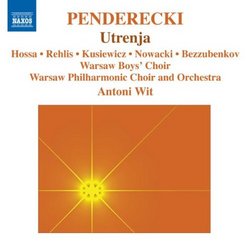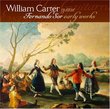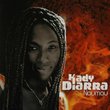| All Artists: Warsaw Boys' Choir, Warsaw Philharmonic, Warsaw Choir and Orchestra, Antoni Wit Title: Krzystof Penderecki: Utrenja Members Wishing: 0 Total Copies: 0 Label: Naxos Original Release Date: 1/1/2009 Re-Release Date: 4/28/2009 Genre: Classical Styles: Opera & Classical Vocal, Symphonies Number of Discs: 1 SwapaCD Credits: 1 UPC: 747313203178 |
Search - Warsaw Boys' Choir, Warsaw Philharmonic, Warsaw Choir and Orchestra :: Krzystof Penderecki: Utrenja
 | Warsaw Boys' Choir, Warsaw Philharmonic, Warsaw Choir and Orchestra Krzystof Penderecki: Utrenja Genre: Classical Penderecki's Utrenja was inspired by the Orthodox liturgy for Holy Saturday with its focus on — the lamentation of Christ's death and the Easter Sunday morning service commemorating the — Resurrection. The composer remarks t... more » |
Larger Image |
CD DetailsSynopsis
Product Description Penderecki's Utrenja was inspired by the Orthodox liturgy for Holy Saturday with its focus on the lamentation of Christ's death and the Easter Sunday morning service commemorating the Resurrection. The composer remarks that 'Utrenja is a combination of pure, a cappella vocal writing and orchestral effects (for strings and percussion) very much connected with electronic music'. Enthusiastically received by audiences, it stands beside his Polish Requiem (8.557386-87) and St Luke Passion (8.557149) as one of the towering masterpieces of modern Polish music. Similar CDs
|
CD ReviewsIf you love this piece try to get the earlier versions I. Zopen | Bronx, NY | 05/09/2009 (3 out of 5 stars) "This is certainly a worthwhile recording of this monumental piece, and I would recommend it; however, serious Penderecki collectors will want to stick with the 1973 Polskie Nagrania recording also by the Warsaw Philharmonic. If you are a particularly fortunate record hunter, you may someday see the 1971 Eugene Ormandy Philadelphia Orchestra recording (only on LP). If you see it, buy it. The only drawback is that it is only of Part I of the piece and not Part II. In my opinion, the Ormandy is the best. Another collectors note: The Polskie Nagrania recording was also once published in the form of a Phillips Box Set (2LP's). That would be the 'holy grail' collector's item." Sonic Spectacular! J. Wright | 04/30/2009 (5 out of 5 stars) "If you like thorny and extravagant High Modernism, then you must hear this. I used to love this piece (circa 1070 when it was written), but no recording has been available for decades. Now comes a new recording from modest little Naxos, and it is a stunner - with a huge dynamic range and excellent work from the Warsaw Philharmonic and conductor Wit, who seems to specialize in these enormous choral works. The chorus sings, shouts, chants, and whispers in sliding atonal clusters of sound, surrounded by great dramatic outbursts from the orchestra (there is a big part for the bass drum and something that sounds like an anvil!). Better yet are the several Basso Profundos who sing demented church-style chants. Interspersed are a number of quieter sections that recall, alternatively, Palestrina, Slavic folk songs, and Orthodox church music. It all builds repeatedly to gargantuan, even frightening, climaxes (your neighbors will hate you). Charles Ives used to boast the he didn't write music for "sissies" - neither did Penderecki. " "Liberating sound beyond tradition" Tym S. | San Francisco, CA USA | 05/12/2009 (4 out of 5 stars) "Krzysztof PENDERECKI, "Utrenja"
"All I'm interested in is liberating sound beyond all tradition," declared the young Penderecki, who in the 60's formally undermined Communist control of Poland by using mostly textures and tones in avant-garde compositions, and flaunting catholic sources under an athiest state. His two-part "Utrenja" is a challenging and emotional evocation of the "Entombment" (I) and "Resurrection" (II) of Christ. This 1971 duo carried deep metaphorical resonance for the generation chafing under the post-'68 crackdown, and propelled Penderecki's international support. These are mainly choral pieces, led by three male and two female soloists, backed by a ephemeral choir and very percussive orchestra. They use the voice for emotional textures, not as angelic arias, to convey the anguish of the death of Jesus and astonishment at his return. Voices declare, argue, whisper, and lament. They shift between dissonant thickets of babble, chanted recitations, transcendent tones, penitent solos, fragmented murmurs, alarmed clarions, and white noise. It is intense and strangely beautiful. Sharp, bold orchestral rapids direct the flow of vocals like a rocky stream. This is a music of deep drama and complex emotional range, an epic story played out through a sonic landscape. Far from an aloof exercise, it is breathless, eerie, and alive. Penderecki's use of driving percussion, dissonant or alien choirs, and tense silences made him a natural for edgy film scores; many of his works have been used to classic effect in such films as Friedkin's "The Exorcist", Kubrik's "The Shining", Lynch's "Wild At Heart" and "Inland Empire", and Cuaron's "Children of Men"." |





